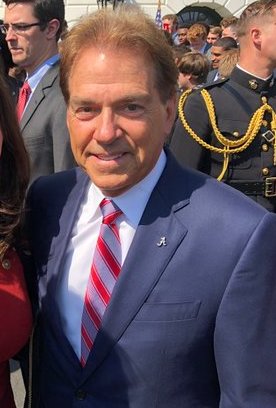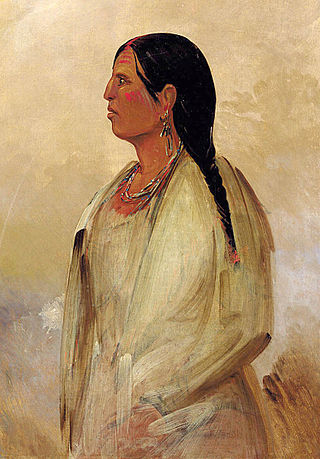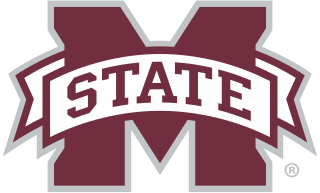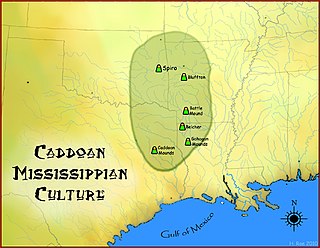Related Research Articles

Alabama is a state in the Southeastern region of the United States. It borders Tennessee to the north, Georgia to the east, Florida and the Gulf of Mexico to the south, and Mississippi to the west. Alabama is the 30th largest by area and the 24th-most populous of the 50 U.S. states.

Arkansas is a landlocked state in the South Central region of the Southern United States. It borders Missouri to the north, Tennessee and Mississippi to the east, Louisiana to the south, Texas to the southwest, and Oklahoma to the west. Its name derives from the Osage language, and refers to their relatives, the Quapaw people. The state's diverse geography ranges from the mountainous regions of the Ozark and Ouachita Mountains, which make up the U.S. Interior Highlands, to the densely forested land in the south known as the Arkansas Timberlands, to the eastern lowlands along the Mississippi River and the Arkansas Delta.

The Gulf South Conference (GSC) is a college athletic conference affiliated with the National Collegiate Athletic Association (NCAA) at the Division II level, which operates in the Southeastern United States.

The Southern United States, sometimes Dixie, also referred to as the Southern States, the American South, the Southland, Dixieland, or simply the South, is a geographic and cultural region of the United States of America. It is between the Atlantic Ocean and the Western United States, with the Midwestern and Northeastern United States to its north and the Gulf of Mexico and Mexico to its south.

The flags of the U.S. states, territories, and the District of Columbia exhibit a variety of regional influences and local histories, as well as different styles and design principles. Modern U.S. state flags date from the turn of the 20th century, when states considered distinctive symbols for the 1893 World's Columbian Exposition in Chicago, Illinois. Most U.S. state flags were designed and adopted between 1893 and World War I.

The Eastern United States, often abbreviated as simply the East, is a macroregion of the United States located to the east of the Mississippi River. It includes 17-26 states and Washington, D.C., the national capital.

Nicholas Lou Saban Jr. is an American sportscaster and former professional and college football coach. He serves as an analyst for ESPN's College GameDay, a television program covering college football. He is widely considered to be one of the greatest football coaches of all time. Saban served as head coach of the National Football League (NFL)'s Miami Dolphins and at four universities: Louisiana State University (LSU), Michigan State University, the University of Toledo and most famously the University of Alabama, where he last coached from 2007 to 2023.

The Mississippian culture was a Native American civilization that flourished in what is now the Midwestern, Eastern, and Southeastern United States from approximately 800 to 1600, varying regionally. It was known for building large, earthen platform mounds, and often other shaped mounds as well. It was composed of a series of urban settlements and satellite villages linked together by loose trading networks. The largest city was Cahokia, believed to be a major religious center located in what is present-day southern Illinois.

Thomas Hawley Tuberville is an American politician and retired college football coach who is the senior United States senator from Alabama, a seat he has held since 2021. Before entering politics, Tuberville was the head football coach at Auburn University from 1999 to 2008. He was also the head football coach at the University of Mississippi from 1995 to 1998, Texas Tech University from 2010 to 2012, and the University of Cincinnati from 2013 to 2016.

Indigenous peoples of the Southeastern Woodlands, Southeastern cultures, or Southeast Indians are an ethnographic classification for Native Americans who have traditionally inhabited the area now part of the Southeastern United States and the northeastern border of Mexico, that share common cultural traits. This classification is a part of the Eastern Woodlands. The concept of a southeastern cultural region was developed by anthropologists, beginning with Otis Mason and Franz Boas in 1887. The boundaries of the region are defined more by shared cultural traits than by geographic distinctions. Because the cultures gradually instead of abruptly shift into Plains, Prairie, or Northeastern Woodlands cultures, scholars do not always agree on the exact limits of the Southeastern Woodland culture region. Shawnee, Powhatan, Waco, Tawakoni, Tonkawa, Karankawa, Quapaw, and Mosopelea are usually seen as marginally southeastern and their traditional lands represent the borders of the cultural region.

Daniel Mullen is an American former college football player and coach, and current television analyst with ABC and ESPN. He served as the head football coach at Mississippi State University from 2009 to 2017 and the University of Florida from 2018 until 2021.

Arthur Gustavo Malzahn III is an American football coach. He is currently the head coach at the University of Central Florida (UCF). He was the head football coach at Auburn University from 2013 to 2020. He helped lead the 2010 Auburn Tigers to a National Championship as the team's offensive coordinator. As head coach at Auburn, he led the team to a SEC Championship win and an appearance in the 2014 National Championship. Malzahn has coached Heisman winner Cam Newton and two Heisman finalists: Nick Marshall and Tre Mason, including coaching 14 All-Americans. During Malzahn's tenure at Auburn, he qualified as the second-longest tenured head coach at one school in the SEC, behind Nick Saban. Out of active head coaches, Malzahn also holds the best record against coach Saban.

The Mississippi State Bulldogs football program represents Mississippi State University in the sport of American football. The Bulldogs compete in the Football Bowl Subdivision (FBS) of the National Collegiate Athletic Association (NCAA) and the Western Division of the Southeastern Conference (SEC). They also have won one SEC championship in 1941 and a division championship in 1998. The Bulldogs have 26 postseason bowl appearances. The program has produced 38 All-Americans, 171 All-SEC selections, and 124 NFL players. The Bulldogs’ home stadium, Davis Wade Stadium at Scott Field, is the second oldest in the NCAA Division I FBS.

Mississippi is a state in the Southeastern region of the United States. It borders Tennessee to the north, Alabama to the east, the Gulf of Mexico to the south, Louisiana to the southwest, and Arkansas to the northwest. Mississippi's western boundary is largely defined by the Mississippi River, or its historical course. Mississippi is the 32nd largest by area and 35th-most populous of the 50 U.S. states and has the lowest per-capita income. Jackson is both the state's capital and largest city. Greater Jackson is the state's most populous metropolitan area, with a population of 591,978 in 2020.

The Plaquemine culture was an archaeological culture centered on the Lower Mississippi River valley. It had a deep history in the area stretching back through the earlier Coles Creek and Troyville cultures to the Marksville culture. The Natchez and related Taensa peoples were their historic period descendants. The type site for the culture is the Medora site in Louisiana; while other examples include the Anna, Emerald, Holly Bluff, and Winterville sites in Mississippi.
SEC TV was a syndicated package featuring live broadcasts of college football and basketball events from the Southeastern Conference. It was owned and operated by ESPN Regional Television and shown in more than 50 percent of households in the United States, mostly Southeastern United States markets. SEC TV's football games typically aired in the noon eastern slot that was former home to the Jefferson-Pilot/Raycom Sports SEC game of the week. Games were shown locally on broadcast stations, regional sports networks, as well as on ESPN GamePlan, ESPN Full Court, and WatchESPN.

The Caddoan Mississippian culture was a prehistoric Native American culture considered by archaeologists as a variant of the Mississippian culture. The Caddoan Mississippians covered a large territory, including what is now Eastern Oklahoma, Western Arkansas, Northeast Texas, Southwest Missouri and Northwest Louisiana of the United States.

Danny Hugh Freeze Jr. is an American football coach who is the head coach at Auburn University. A successful high school football coach at Briarcrest Christian School in Memphis, Tennessee, Freeze coached Michael Oher and Greg Hardy. He subsequently was the head football coach at Lambuth University from 2008 to 2009, Arkansas State University in 2011, the University of Mississippi from 2012 to 2016, and Liberty University from 2018 to 2022.
Alabama Crimson Tide football under Nick Saban covers the history of the Alabama Crimson Tide football program from when Nick Saban was hired as head coach in 2007 up until his retirement after the 2023 season. Alabama plays as part of the National Collegiate Athletic Association (NCAA) Football Bowl Subdivision (FBS) and is a member of the West Division of the Southeastern Conference (SEC). The Tide plays its home games at Bryant–Denny Stadium in Tuscaloosa, Alabama. Their overall official record under Saban was 201–29 (.878), 23 bowl game appearances with 16 victories, ten SEC West titles, nine SEC championships, and six national championships. From 2008 up until his retirement, Saban's teams have spent part or all of each season ranked at least top 4 in national polls.
References
- ↑ Key, V. O. Southern Politics in State and Nation. New York: A.A. Knopf, 1949. Print.
- ↑ "'Thank God for Mississippi' - Church World Service". Hunger.cwsglobal.org. April 26, 2012. Retrieved May 13, 2013.
- ↑ Cohn, Scott (July 13, 2022). "America's worst state for business: Mississippi is cheap, but its workforce weak". CNBC. Retrieved September 16, 2022.
- ↑ "Adult Obesity Rates - The State of Childhood Obesity". September 16, 2022. Archived from the original on September 16, 2022. Retrieved September 16, 2022.
- ↑ "TGFM: La. second unhealthiest state - The Independent Media Group". Theind.com. December 8, 2010. Retrieved May 13, 2013.
- ↑ Povich, Elaine S. (October 7, 2010). "Arkansas: Battle for the Statehouse, Governor Election - AARP Bulletin". Aarp.org. Retrieved May 13, 2013.
- ↑ "After 148 years, Mississippi finally ratifies 13th Amendment, which banned slavery". www.cbsnews.com. February 18, 2013. Retrieved September 16, 2022.
- ↑ "Overview of Mississippi".
- ↑ Kulo, Warren (August 16, 2022). "Study finds Mississippi is nation's worst state in which to live, again". gulflive. Retrieved September 16, 2022.
- ↑ "Arkansas Governor Mike Beebe". Governor.arkansas.gov. January 11, 2011. Archived from the original on January 21, 2011. Retrieved May 13, 2013.
- ↑ "Fiscal Input Report" (PDF). Nmlegis.gov. Retrieved May 13, 2013.
- ↑ "Alabama and Mississippi all alone in food-tax policy". Archive.decaturdaily.com. April 30, 2007. Retrieved May 13, 2013.
- ↑ Budd McLaughlin (August 29, 2009). "Good news for Alabama business | al.com". Blog.al.com. Retrieved May 13, 2013.
- ↑ "Is 'Thank God For Mississippi Or Arkansas' Finally Behind Us? On West Kentucky Journal". Westkyjournal.com. October 10, 2012. Retrieved May 13, 2013.
- ↑ Stiglitz, Joseph E. (September 12, 2009). "Joe Wilson does other politically challenged states a favor". Slate Magazine. Slate.com. Retrieved May 13, 2013.
- ↑ "Thank god for Mississippi (County). - Free Online Library". Thefreelibrary.com. August 23, 2004. Retrieved May 13, 2013.
- ↑ Brantley, Max (April 7, 2011). "Thank God for Mississippi | Arkansas Blog". Arktimes.com. Retrieved May 13, 2013.
- ↑ "Congo: Africa's 'Thank God for Mississippi'". Radar Online. October 27, 2008. Retrieved May 13, 2013.
- ↑ Sabato, Larry J.; Kondik, Kyle; Skelley, Geoffrey (June 25, 2014). "'Thank God for Mississippi!'". Politico . Archived from the original on September 12, 2015.
- ↑ "Which states are the best (and worst) at vaccinating their kids". The Washington Post. Archived from the original on March 7, 2016.
- ↑ "Thank God for Mississippi". July 1, 2022.
- ↑ "WidespreadEconomic Growth Across States In 2011" (PDF). Bureau of Economic Analysis (Press release). June 5, 2012. p. 7. Archived from the original (PDF) on June 16, 2012. Retrieved December 27, 2012.
- ↑ Data mostly refers to IMF staff estimates for the year 2014, made in April 2015. World Economic Outlook Database-April 2015, International Monetary Fund. Accessed on 14 April 2015.
- ↑ Popik, Barry (October 11, 2008). "The Big Apple: 'Thank God for Mississippi' ('Thank Heaven for Mississippi')". Barrypopik.com. Retrieved May 13, 2013.
- ↑ Zengerle, Jason (December 2, 2008). "Mississippi Is For . . . Education?". New Republic. Retrieved May 13, 2013.
- ↑ Brooks, Thomas R. "In Alabama: A County of Hope". Washington Evening Star. p. 152.
Alabamans have a saying: 'Thank God for Mississippi, or we'd be the poorest state in the nation.'
- ↑ "Thank God for Mississippi". Capstone Report. October 15, 2007. Retrieved May 13, 2013.
- ↑ "Thank God for Mississippi | This Bird's View". Thisbirdsview.wordpress.com. February 17, 2011. Retrieved May 13, 2013.
- ↑ Sanders, Nicole. "Alabama ranks #45 in education, according to a study". WRBL News 3. Retrieved November 5, 2023.
- ↑ "DFW Airport: Bad Luck or Just Bad?". Texas Monthly. August 3, 2015. Retrieved November 29, 2023.
- ↑ "Letter from the President". Arkansas' Independent Colleges & Universities. March 13, 2012. Archived from the original on June 23, 2013. Retrieved May 13, 2013.
- ↑ Tim Murphy (February 1, 2011). "West Virginia Legislator Hatches Plan to Secede". Mother Jones. Retrieved May 13, 2013.
- ↑ "Now in Mississippi: Four S's, Four I's, And a Dollop of P.R". Washingtonpost.com. December 3, 2006. Retrieved May 13, 2013.
- 1 2 Cluth, Jack (January 11, 2009). "The (might as well be official) Texas state motto: 'Thank God for Mississippi'". What Would Jack Do. Retrieved May 13, 2013.
- ↑ Katz, Marc (November 2, 2009). "Thank God for Mississippi".
- ↑ "Tomlinson: To avoid Death Star law, better win elections". May 22, 2023.
- ↑ Hilburn, Greg. "Louisiana ranked worst state as pollution, poverty, violence among factors in U.S. News report". Shreveport Times. Retrieved November 5, 2023.
- ↑ Patton, Alicia. "Tennessee ranked among the unhealthiest states in America, according to Forbes". WKRN.COM. Retrieved November 5, 2023.
- ↑ "Arkansas 4th Most Pro-Life State in the Nation". Family Council. January 25, 2011. Retrieved May 13, 2013.
- ↑ "What Is the State Motto of New Mexico?". Wisegeek.com. Retrieved May 13, 2013.
- ↑ Tungate, Susan (August 17, 2012). "Thank God for Mississippi". SantaFe.com. Archived from the original on May 10, 2013. Retrieved May 13, 2013.
- ↑ "How the UK compares to other Europeans on poverty". Liberal Conspiracy. January 17, 2013. Retrieved May 13, 2013.
- ↑ "OPINION: Erase 'Thank God for Mississippi' from Wikipedia". yallpolitics.com.